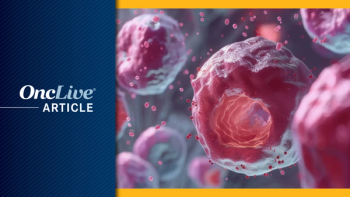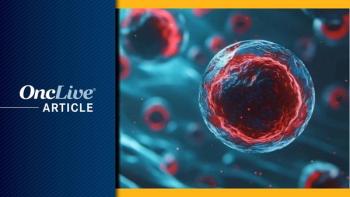
Supplements and Featured Publications
- 2023 Genitourinary Cancers Symposium Meeting Reporter
- Volume 1
- Issue 1
PFS Benefit With Frontline Nivolumab/Cabozantinib Vs Sunitinib Is Independent of PD-L1 or c-MET Status in Advanced RCC

The progression-free survival benefit associated with the combination of nivolumab plus cabozantinib compared with sunitinib was largely independent of PD-L1 and c-MET status in previously untreated patients with advanced or metastatic renal cell carcinoma.
The progression-free survival (PFS) benefit associated with the combination of nivolumab (Opdivo) plus cabozantinib (Cabometyx) compared with sunitinib (Sutent) was largely independent of PD-L1 and c-MET status in previously untreated patients with advanced or metastatic renal cell carcinoma (RCC), according to results from an exploratory post-hoc analysis of the phase 3 CheckMate 9ER trial (NCT03141177).1
Findings presented at the 2023 Genitourinary Cancers Symposium showed that in the Kaplan-Meier analysis, PFS was improved with the doublet vs sunitinib, irrespective of tumor PD-L1 status. PD-L1 expression was not associated with PFS outcome in the nivolumab/cabozantinib arm (P = .72). However, in the sunitinib arm, patients with a PD-L1 expression of at least 1% experienced worse PFS compared with those who had a PD-L1 expression of less than 1% (P = .00045).
Additionally, cytoplasmic c-MET was negatively prognostic but not predictive for PFS outcome with nivolumab/cabozantinib vs sunitinib. Membrane c-MET was neither prognostic nor predictive for PFS outcome with the investigative regimen vs the control.
“This is the first time PD-1–based therapy was looked at [in a biomarker analysis]. We found selected gene expression to be associated with outcome, but none of the signatures we found before,” lead study author Toni Choueiri, MD, director of the Lank Center for Genitourinary Oncology Medical and director of International Strategic Initiatives at Dana-Farber Cancer Institute, and the Jerome and Nancy Kohlberg Professor of Medicine at Harvard Medical School, Boston, Massachusetts, said in a presentation of the data. “[As such,] perhaps these signatures are specific to PD-L1 or PD-1 inhibitor–based therapies, or [are] actually significant and specific for the actual drug and combination.”
In January 2021,
Although prior studies have investigated predictive biomarkers for the use of an anti–PD-L1 antibody with or without and anti-angiogenic in the first-line treatment of advanced RCC, the mechanisms of response to anti–PD-1 plus anti-VEGF agents in advanced RCC remain largely unknown.1 To this end, investigators conducted an exploratory post-hoc analysis to further evaluate biomarkers predictive of efficacy for nivolumab/cabozantinib vs sunitinib.
The trial enrolled 651 patients with previously untreated advanced RCC with a clear cell component. Patients could be of any International Metastatic RCC Database Consortium (IMDC) risk group and needed to have tumor tissue available for analysis.
Patients were randomly assigned in a 1:1 fashion to receive 240 mg of intravenous nivolumab every 2 weeks plus 40 mg of oral cabozantinib every day (n = 323) or 50 mg of oral sunitinib per day on a 4-week-on, 2-week-off schedule (n = 328). Treatment continued until disease progression per RECIST v1.1 criteria or unacceptable toxicity. Patients were stratified by IMDC risk score, PD-L1 expression, and geographic region.
The primary end point was PFS per blinded independent central review (BICR). Secondary end points included overall survival (OS), objective response rate by BICR, and safety.
Regarding the biomarker analysis, assessments were performed on pretreatment tumor samples. The association between biomarkers and PFS was conducted with hallmark gene sets of pre-ranked gene set enrichment analysis (GSEA) using all genes ranked by interaction effect estimates, individual gene expression, as well as gene expression signatures and immunohistochemistry (IHC).
Results from Cox PH models were considered prognostic if a statistically significant overall effect was observed, and they were predictive if a statistically significant interaction effect was observed.
Of the 640 patients treated on the trial, 410 were evaluable for RNA sequencing. Regarding IHC testing, 628 patients were evaluable for PD-L1, 410 patients for CD8, and 604 patients for c-MET. Study authors noted that demographic characteristics and clinical outcomes were similar for the RNA-evaluable patients compared with the all-treated population.
GSEA identified hallmark gene sets with higher expression of genes associated with PFS outcomes for nivolumab/cabozantinib vs sunitinib. Hallmark gene sets with higher expression of genes linked with longer survival outcomes for nivolumab plus cabozantinib vs sunitinib comprised oxidative phosphorylation, hypoxia, adipogenesis for PFS and OS and TNFA signaling via NFKB pathways for OS. Gene sets with higher expression of genes linked with shorter PFS and OS with nivolumab/cabozantinib vs sunitinib included E2F targets.
“We looked at individual genes contributing to some enriched hallmark gene sets associated with PFS outcome, and we found this to be prognostic, but none were predictive,” Choueiri said.
Of the 410 patients evaluable for CD8 topology analysis, 47% had an inflamed CD8 phenotype, 40% were cold, and 13% were excluded. A Kaplan-Meier analysis by CD8% of low, medium, or high showed that higher CD8% was linked with improved PFS for nivolumab/cabozantinib but not with sunitinib. In Kaplan-Meier analyses of CD8 topology, an association was observed between the inflamed phenotype and improved PFS (P < .0001) and OS (P = .00097) for nivolumab/cabozantinib vs sunitinib.
However, a Cox Proportional-Hazards analysis leveraging continuous-scale data did not show a significant association between CD8% or CD8 topology and survival outcomes irrespective of treatment.
Choueiri noted that exploratory biomarker discovery from CheckMate 9ER is ongoing, and investigators aim to identify a predictive biomarker or composite model of nivolumab/cabozantinib efficacy.
References
- Choueiri TK, Motzer RJ, Powles T, et al. Biomarker analysis from the phase 3 CheckMate 9ER trial of nivolumab + cabozantinib v sunitinib for advanced renal cell carcinoma (aRCC). J Clin Oncol. 2023;41(suppl 6):608. 10.1200/JCO.2023.41.6_suppl.608
- FDA approves nivolumab plus cabozantinib for advanced renal cell carcinoma. News release. FDA. January 22, 2021. Accessed March 2, 2023.
https://www.fda.gov/drugs/resources-information-approved-drugs/ - Choueiri TK, Powles T, Burotto M, et al. Nivolumab plus cabozantinib versus sunitinib for advanced renal-cell carcinoma. N Engl J Med. 2021;384(9):829-841. doi:10.1056/NEJMoa2026982
- Burotto M, Powles T, Escudier B, et al. Nivolumab plus cabozantinib vs sunitinib for first-line treatment of advanced renal cell carcinoma (aRCC): 3-year follow-up from the phase 3 CheckMate 9ER trial. J Clin Oncol. 2023;41(suppl 6):603. doi:10.1200/JCO.2023.41.6_suppl.603
Articles in this issue
almost 3 years ago
Nivolumab Displays Sustained Survival Benefits in Urothelial Carcinomaalmost 3 years ago
Pembrolizumab Produces High DFS Rates in BCG-unresponsive NMIBCalmost 3 years ago
Abiraterone/Olaparib Benefit Is Sustained in Final OS Analysis for mCRPCalmost 3 years ago
Talazoparib Plus Enzalutamide Improves rPFS in First-line mCRPC


































